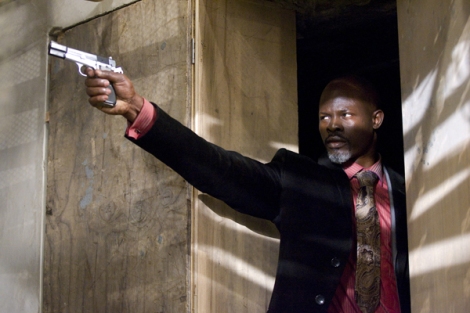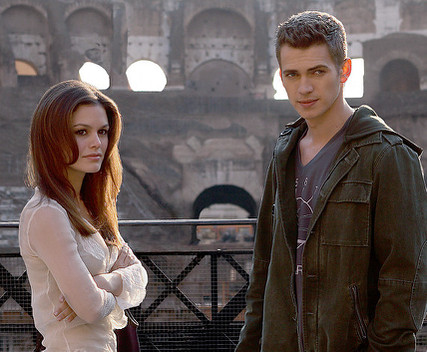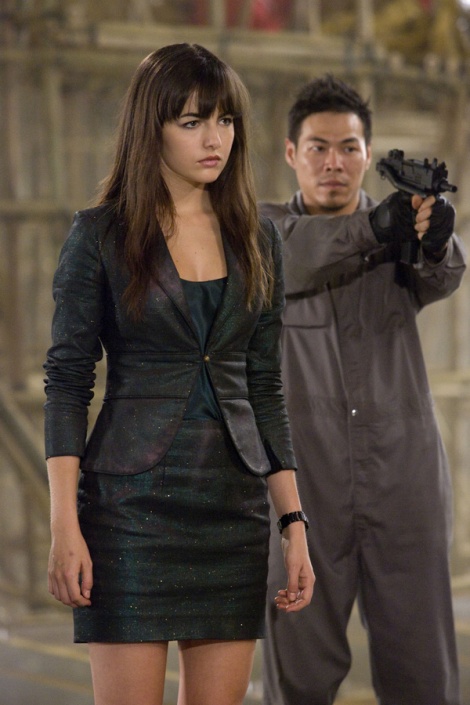Jumper & Push
Film reviews by: Witney Seibold
I’m a teetotaler, so I must do things like watch Doug Liman’s “Jumper” (2008) and Paul McGuigan’s “Push” (2009) back-to-back to stretch myself to new extremes. I was hoping for an experience delirious and silly. Indeed that was what I got, but the films’ combined power did not get me as high as I had hoped.
Indeed, when looked at in a certain light, these two films are nearly identical. They both involve a small group of young people with specialized superpowers, and a group of government-sponsored elders trying to kill them. This seems like a flawed dynamic to me, as it flies in the face of most adolescent power fantasies; if you are a teenager who discovers they can read minds or teleport, surely you’d have fantasies of being a superhero, or at least an unstoppable hedonist. I don’t know about you, but my superpower fantasies never involve a shadowy government enclave trying to kill me.
(I have similar problems with “Harry Potter” and other recent children’s fantasy; why introduce this wonderfully wide and fantastical new world of magic and childhood glory, only to divide the characters into opposing sides and have them fight? It seems like a waste.)
But that’s as may be, as both “Jumper” and “Push” seem to trying to invent a new “mythology.” i.e. They want to, I think, begin entirely new franchises. With all the recent remakes and adaptations we’ve been seeing in American cinemas, I can give props to the makers fro trying to start from scratch. I admire that ambition. It’s a pity that neither film is very interesting.
I started with “Jumper.” Written by comic book adapter David S. Goyer (who did all three “Blade” movies, “The Crow: City of Angels,” the two most recent “Batman” films, and the excellent “Dark City”), and directed by Liman (who did the overrated “The Bourne Identity”), “Jumper” is about a teenage boy named David Rice (Max Thieriot at 15, Hayden Christensen at twentysomething) who discovers that he can teleport. He can just concentrate on a certain place and, SWIZ!, he’s there. As a teenager, he thinks to do what most teenagers would probably think: he runs away from his horrible father (Michael Rooker) and becomes a bank thief.
We catch up with David when he’s in his twenties and living the Life of Reilly. Thanks to his teleporting, he’s constantly covered for money. He picks up women in British pubs, goes surfing in Bali, and has lunch on the head of the Sphinx, all in the same morning. Adjustments for time differences aren’t handled too well in this film, but I’m guessing he keeps a close eye on the time. David is very thin and cut and good-looking, which is baffling as he is so lazy that he teleports around the room, and even a few inches away to pick up a remote control rather than move.
David has been having run-ins with a creepy fellow named Roland. Roland is played by Samuel L. Jackson, who turns in one of the weirdest performances I have seen. He seems to be channeling latter-day Nicolas Cage in this film. That his hair is bleached milk white doesn’t help things. Roland is part of a shadowy group called Paladins who, for reasons that are completely obscure, live to hunt down and kill people who can teleport. Yes, there are many people with teleporting powers in this universe, and there are other people who have nifty gadgets to kill them.
Having this “villain” dynamic would be fine, were David anything of a “hero.” David is not a hero. He is seen early in the film watching a new report of people in peril, and I think we’re supposed to note that he does nothing to help them. By the end of the film, he’s still not helping people, choosing to continue his life of hedonism. Why does this guy need “villains” chasing him? Perhaps he’s the villain? Hm… No, the film is not that complex.
David teleports back to his hometown to meet up with his old crush Millie (Rachel Bilson from “The O.C.”), and fly her away to Rome. Yes, they actually get on a plane this time. The Millie character is supposed to introduce an element of risk into the story; we finally learn what David’s vulnerability is. This substory, however, reveals the central weakness of “Jumper” and that is the acting of the two leads. Christiansen is bland and wooden, and seems to have no facial expressions. I said this of his performance in “Star Wars II,” but it’s true here as well: he looks like a model who is acting at gunpoint. Christiansen has given a good performance in “Shattered Glass,” but that was a character that played to his strengths. He shouldn’t play tough guys; he’s more suited to sniveling liars. Give him the Philip Seymour Hoffman role, and we’ll see him shine.
Christiansen’s performance, though shine when set into comparison to Rachel Bilson who has two large, pretty eyes and not a single thought behind them. David seems to be in love with Millie, but I can’t see why anyone would want to be around this whiny, soporific L.A. brat. I’ve not seen any of her work on “The O.C.,” but Bilson is perfectly bland in this film. Her face is like a giant pretty unmoving cookie.
Eventually David also meets up with another teleporter named Griffin (Jamie Bell). Griffin knows all about the Paladins, and is determined to stay hidden, and gets pissed off whenever David shows up. The two eventually form an alliance, but not before having a really spectacular chase scene that involves the entire world. The chase is the best part of the film. There’s then a big fight scene between the jumpers and the paladins and whatever.
Superhero films rarely deal with the practical applications of superpowers, and “Jumper” goes out of it way to avoid answering any questions. The early scenes are refreshingly direct, in that they show what a young superpowered person would really do with their powers (with great power comes no responsibility, if you will). But I resented their attempts to make me care about a vast conspiratorial story arc. When “Jumper 2” is eventually made, I’ll probably skip it.
Oh, and Diane Lane is in this film as David’s mom. She is in two scenes. I would have rather seen a film about her character, starring Lane.
So yeah, “Jumper” is every bit as shallow and as pretty and and dumb as you would expect it to be. It’s perfectly suited to a certain brand of angry, ignorant nerd who prefers complex mythologies and canon over strong character, original story, or groundbreaking ideas within the genre.
In comparison, “Push” is much better. Which is to say, sadly, it’s still not very good.
Directed by Paul McGuigan, (“Lucky Number Slevin,” “Wicker Park”), “Push” tries to set up a far more complicated mythology than “Jumper,” and while that mythology is baffling, and the story so complex as to be confusing, we at least get a large cast of talented actors in varied roles. We can never be sure at times who is working for what side (and since certain character have the psychic powers to change someone’s intentions, it gets even more confusing), but at least we have actors that make us believe they’re fighting for something.
So here’s the setup: In the ‘60s, the government performed experiments on certain children, enhancing their psychic powers. These children could each do one of the following: intuit locations, see the future, change the intentions of others, move objects with their minds, make people’s heads explode. Each had a respective nickname like pushers, readers, screamers, laughers, jumpers. …Oh wait.
The children of those children have now grown up, and are either operating within the same government institution, or they are hiding from it.
Our main character is hiding in Hong Kong. He is Nick Gant (Chris Evans), and he is a telekinetic. It’s unclear as to why this film takes place in Hong Kong, but it does add some much-needed color to the surroundings. One morning he is visited by a 12-year-old who can see the future. This is Cassie, and she is played by Dakota Fanning, who, despite her scoffed-at “It”-girl status, is a terrific young actress, and only seems to be improving with age. Cassie warns Nick that one Henry Carver (Djimon Hounsou) is trying to kill his ex-girlfriend Kira (Camilla Belle sexy). Both Henry and Kira have “pushing” powers, in that they can psychic make people do things.
Kira was given an experimental drug that makes her powers stronger, but kills most psychics. The bulk of “Push” is a race against time to find Kira, and, once they find her, to outwit Henry and take down his institution once and for all. Is the institution evil? Ever seen a film where a shadowy government institution wasn’t? There are some psychic battles that are kind of fun, especially when one can float guns through the air.

Ah kih yew too! (Two evil governemt institutions run by two cool black gys in two different movies? Hm...)
Some of the conceits in this film are very clever. For instance, how do you trick someone who can read minds, see the future, and change your intentions? One sequence involves a cleverly set up series of envelopes and erased memories. The film would have been grand, had it just been a “Memento” style chase of notes left to oneself.
There is also a complicated plot involving the local Triad, and players on all three sides are constantly trying to outwit one another. The psychic powers in this film are so complicated and frustratingly vague, though, that it’s really hard to tell what’s going on most of the time. We are introduced to other characters played by Ming-Na Wen, Neil Jackson, and Cliff Curtis, but I won’t spend more time in this labyrinth explaining what they do.
I did kind of like “Push,” especially in the light of “Jumper,” which was a children’s film in comparison. I liked the acting all around (Fanning especially), and I was fond of the characters, however vague they were at times. I cannot, however, recommend it, as it’s baffling and self-indulgent. It’s fine to have a complex story, and I don’t even object to a setup for a sequel, but it’s obvious when you’re trying to create a “mythology.”
Here’s a tip for all you aspiring screenwriters and authors of fantasy fiction: If you want to create a fantasy “mythology,” start with a human character that we can relate to. Give them a life and a backstory and intentions and human qualities. Let us know how they feel about being superpowered and how they’ve been dealing with it. Don’t bother with complex plotting; a plot is not better just because it has a lot of ins and outs. It can be (See David Mamet), but it rarely works.









I thought both movies were awsome. Unforunetly there are always haters talking trash about them. It’s called entertainment, if you don’t like, then don’t watch it.
The only reason I read (some of) this article was cause im trying to find similar movies. Again unfortunetly you got doucshes like this guy clutering everything up.
Don’t you have something better to do than talk smack.
What a frankly good read
Particularly well executed post
Awfully well written blog post
I actually watched both and I just loved them. I’m actually a fan of this type of moves, people with supernatural powers in the modern world etc. etc. I’m been searching for more movies like this but I can’t seem to find anymore hmmm…
Anyway, nice blog though! It;s really informative. ^^
I feel like you didn’t really pay attention to either movies which shows you shouldn’t be making a review on either.
Firstly, despite there being people with powers does not mean that they are heroes, and just because they have powers and are the main characters, does not mean that their antagonist is a ‘villain’, it simply means that they do what every piece of cinema and literature does and they gave the protagonist an antagonist, because it’s been shown that a story with a main character who faces no conflict tends to be very boring.
In short, their needs to be some conflict, when it comes to superpowered beings, the best conflict is with another being. Doesn’t make them the ‘villain’, it makes them the antagonist.
Carver wasn’t trying to kill Kira, he was trying to capture her, the fact that you completely missed that makes me think you didn’t pay any attention.
I’ll agree that the characters lacked much zest, of those two movies combined, I found Carver the most interesting, maybe it’s just he was so attractive. The relationships were bland and extremely unbelievable, and I guess that blame is to fall on how much attention they were giving to the complex powers. Jumping and pushing and moving and all that good stuff. I don’t know how these movies weren’t original, I mean, as original as superpower movies can be.
In argument to your “why divide characters into groups and have them fight”, that goes back to my antagonist discussion. Stories have antagonists, the antagonist causes problems for the protagonist. How can you be a critic if you don’t understand the simple conflict system. Man v man, man v nature, man v self, man v fate, man v society (I think that’s all).
I actually have imagined myself with abilities and such and I, it may just be me, do tend to imagine the government sending forces after me to take me down. That may just be paranoia but I find it believable that if someone has something that is powerful and no one else has, the government would probably try to capture or eliminate this person at all costs. That’s pretty believable. So yeah.
Not a very good review since it seemed as if you didn’t even pay attention to the movies.
Conflict is not the heart of a movie. It is a way to manufacture story. A story is merely the clothesline on which the movie hangs. It needs to be tight, but it’s not what your looking at.
To cite Ebert’s Law: A movie is not about what it’s about, but how it’s about it.